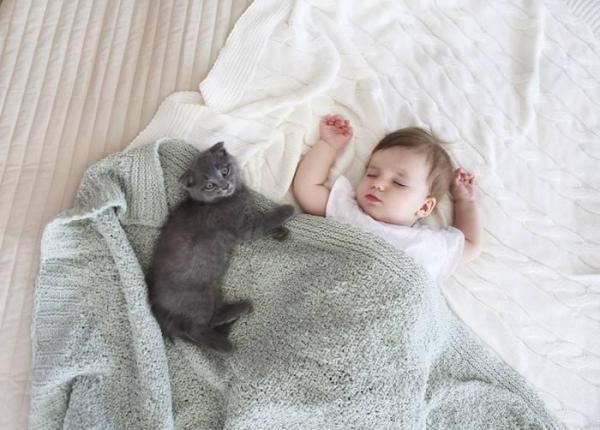Can Cats Live with Newborns?



See files for Cats
The arrival of a newborn is a joyous occasion in any family, but for some pet owners, it can also spark a question: can cats live with newborns? The answer is positive, but achieving a harmonious household requires understanding the dynamics between these two very different members of your family. Get ready to navigate this exciting new chapter with confidence.
This AnimalWised article guide dispels the myths and offers practical advice to ensure a safe and happy coexistence for both your cat and your baby. We'll delve into the world of cat behavior, explore potential concerns, and provide tips on creating a smooth and positive transition for everyone involved.
Understanding cat behavior
Cats are known for their independence and playfulness. However, when a baby enters the picture, creating a harmonious environment for both becomes a priority. To achieve this, understanding your cat's typical behavior and how they react to change is crucial.
First, it is crucial to know that cats are masters of nonverbal communication, using a variety of signals to express themselves. By learning to "read" these signals, you can anticipate your cat's needs. Learn more about how cats communicate in this other article.
Cats are creatures of habit, and a baby introduces a significant change. New sights, sounds, and smells associated with a baby can be overwhelming for your feline friend. Loud noises like crying, unpredictable movements, and unfamiliar scents can cause stress and anxiety. Newborns also come with a distinct scent, different from your usual routine. These sensory changes can be startling for a cat.
As much as possible, try to maintain your cat's regular feeding and litter box routines to provide a sense of normalcy amidst the changes. Cats are masters of getting their humans' attention, but a baby will naturally demand a lot of your time. This change can lead to feelings of jealousy or anxiety in your cat.
Other factors such as the breed, age, and personality all play a role in how your cat will react to a baby. Some breeds, like Maine Coons or Ragdolls, are known for their gentle nature and may take well to babies. Other breeds, like Bengals, might be more independent and require a slower, more cautious introduction.
In terms of the age, kittens are typically more adaptable than senior cats, set in their ways. However, even older cats can learn to adjust with patience and positive reinforcement.
However, at the end of the day, each cat is unique. This is why understanding your cat's individual quirks is key. Is your cat shy or outgoing? Playful or more reserved? Tailoring the introduction process to their personality will help them feel more comfortable. Some cats might actually thrive with the increased activity and attention that comes with a baby. The added stimulation could even reduce their stress levels.

Preparing for the newborn's arrival
The arrival of a baby is an exciting time but, as mentioned before, it's also a period of adjustment for your cat. To ensure a smooth transition for both your cat and your newborn, planning and preparation are key. Let's explore some steps you can take to create a harmonious environment:
- Introduce new baby items (crib, stroller) weeks or even months before the baby's arrival. Let your cat sniff and explore these objects at their own pace. Wash them with familiar scents like your own laundry or a blanket used by the baby in the hospital to help them adjust.
- Create designated safe spaces for both your cat and the baby. The nursery should be a cat-free zone, especially in the early days. Use baby gates or keep the door closed to prevent the cat from entering when unsupervised. Ensure that the crib is off-limits to the cat. You can use crib nets or covers to prevent the cat from jumping in.
- Your cat might also use some space, this could be a high perch, a cozy cat bed in a quiet room, or a cat tree. Ensure these areas are accessible and provide a sense of security when things get overwhelming. If the cat has a favorite resting spot, try to maintain that space for it. Avoid major disruptions to these comfort zones.
- Continue offering affection, playtime, and treats to reassure them they're still loved. Dedicate time each day to play with and interact with your cat. This helps to keep the cat mentally stimulated and reassured of its place in the household. Also, ensure that the cat’s litter box is cleaned regularly and kept in a quiet, accessible location.
- Trim your cat's nails, because this can help minimize any potential scratches during accidental interactions with the baby. In general, always supervise your cat and baby when they're in the same space, especially during the initial stages.
A happy cat means a happy home. Our recommended article delves into training your cat to sleep in their designated spot.
How to introduce a baby to a cat?
The initial meeting between the cat and the baby should be calm and controlled. It is important to choose a quiet time when the house is calm, and the cat is relaxed. Here is what to do:
- Choose a neutral space in your home where the cat hasn't spent a lot of time recently. This helps minimize territorial feelings. Ensure there's enough room for the cat to retreat if they feel overwhelmed.
- When you return home with the baby, consider introducing the cat to the baby's scent through the blanket or clothes again. Offer the cat affection, praise, and even treats to associate the baby's scent with good things.
- Don't bring the cat directly up to the baby. Instead, let the cat enter the room first and explore the space at their own pace.
- Keep initial interactions brief and positive. Gradually increase the duration as both the cat and baby get more accustomed to each other. The first meeting might not be a cuddle session. It's a success if the cat shows curiosity or neutral behavior towards the baby.
- Speak softly and calmly throughout the interaction. Avoid loud noises or sudden movements that might startle the cat.
- Don't force interactions. Let the cat approach the baby on their own terms. Observe the cat's body language. Signs of fear or anxiety include flattened ears, tucked tail, or hissing. If the cat displays these signs, give them space and try again later.
- Reward the cat with treats and praise for calm behavior around the baby. This helps to create positive associations with the baby.
- Don't allow the cat to directly touch the baby's face or head. This could be risky for the baby. If the cat shows gentle interest, a brief sniff under close supervision might be okay. However, it's best to err on the side of caution and redirect the cat with a toy if they become too curious.
- Maintain positive interactions with your cat throughout this period. Continue offering affection, playtime, and treats to reassure them they're still loved.
- If the cat shows unwanted behavior like scratching furniture, redirect them to a scratching post with a toy.
If you're concerned about the interactions or have difficulty managing them, consider consulting a certified animal behaviorist for personalized guidance.
This article explored introducing your baby to your cat, but have you considered your cat's existing relationships? Our recommended article delves into the art of introducing a new cat to another cat, ensuring everyone feels safe and secure in your multi-cat home.


Potential concerns of having cats around newborns
While cats can be wonderful companions, there are some potential concerns to consider when welcoming a newborn into a home with cats.
- Cats can carry parasites and bacteria that can be harmful to newborns, whose immune systems are still developing. It's crucial to keep your cat's vaccinations up-to-date and ensure proper hygiene practices like frequent handwashing after handling litter boxes.
- A cat might curl up on a baby in a crib or bassinet, potentially causing breathing difficulties. Never leave a newborn unattended with a cat.
- Cat dander (microscopic skin flakes) can trigger allergies and asthma in some babies. Regular cleaning and HEPA filters can help minimize allergens in the environment. Consult your pediatrician if you have concerns about your baby's allergies.
- Toxoplasmosis is an infection caused by the parasite Toxoplasma gondii, which can be found in cat feces. While toxoplasmosis can be serious, particularly for pregnant women and immunocompromised individuals, it is relatively rare in healthy adults. Pregnant women should avoid changing litter boxes and ensure someone else takes on that responsibility.
- Cats can unintentionally scratch or bite a baby during play or out of fear. Keep your cat's nails trimmed and closely supervise interactions between them and the baby.
- Cats can become jealous of the increased attention a baby receives. This can lead to behavioral changes like litter box problems, scratching furniture, or vocalization. Providing your cat with continued affection, playtime, and designated safe spaces can help them adjust.
If you want to read similar articles to Can Cats Live with Newborns?, we recommend you visit our Facts about the animal kingdom category.








